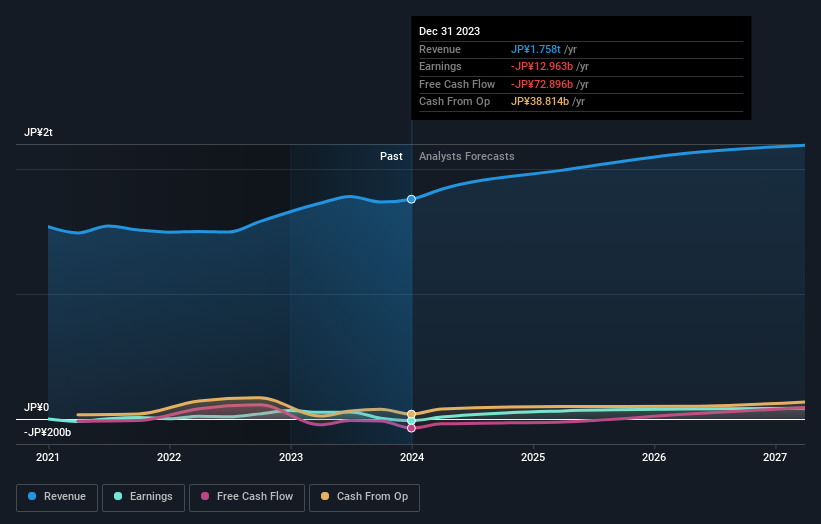Stock Analysis
Kawasaki Heavy Industries, Ltd.'s (TSE:7012) market cap dropped JP¥28b last week; individual investors who hold 54% were hit as were institutions

Key Insights
- The considerable ownership by individual investors in Kawasaki Heavy Industries indicates that they collectively have a greater say in management and business strategy
- 44% of the business is held by the top 25 shareholders
- Institutional ownership in Kawasaki Heavy Industries is 40%
Every investor in Kawasaki Heavy Industries, Ltd. (TSE:7012) should be aware of the most powerful shareholder groups. We can see that individual investors own the lion's share in the company with 54% ownership. That is, the group stands to benefit the most if the stock rises (or lose the most if there is a downturn).
While the holdings of individual investors took a hit after last week’s 3.4% price drop, institutions with their 40% holdings also suffered.
In the chart below, we zoom in on the different ownership groups of Kawasaki Heavy Industries.
See our latest analysis for Kawasaki Heavy Industries

What Does The Institutional Ownership Tell Us About Kawasaki Heavy Industries?
Institutional investors commonly compare their own returns to the returns of a commonly followed index. So they generally do consider buying larger companies that are included in the relevant benchmark index.
As you can see, institutional investors have a fair amount of stake in Kawasaki Heavy Industries. This suggests some credibility amongst professional investors. But we can't rely on that fact alone since institutions make bad investments sometimes, just like everyone does. When multiple institutions own a stock, there's always a risk that they are in a 'crowded trade'. When such a trade goes wrong, multiple parties may compete to sell stock fast. This risk is higher in a company without a history of growth. You can see Kawasaki Heavy Industries' historic earnings and revenue below, but keep in mind there's always more to the story.

Kawasaki Heavy Industries is not owned by hedge funds. The company's largest shareholder is Nomura Asset Management Co., Ltd., with ownership of 5.7%. For context, the second largest shareholder holds about 4.5% of the shares outstanding, followed by an ownership of 4.2% by the third-largest shareholder.
On studying our ownership data, we found that 25 of the top shareholders collectively own less than 50% of the share register, implying that no single individual has a majority interest.
While studying institutional ownership for a company can add value to your research, it is also a good practice to research analyst recommendations to get a deeper understand of a stock's expected performance. There are plenty of analysts covering the stock, so it might be worth seeing what they are forecasting, too.
Insider Ownership Of Kawasaki Heavy Industries
The definition of company insiders can be subjective and does vary between jurisdictions. Our data reflects individual insiders, capturing board members at the very least. Management ultimately answers to the board. However, it is not uncommon for managers to be executive board members, especially if they are a founder or the CEO.
Insider ownership is positive when it signals leadership are thinking like the true owners of the company. However, high insider ownership can also give immense power to a small group within the company. This can be negative in some circumstances.
Our most recent data indicates that insiders own less than 1% of Kawasaki Heavy Industries, Ltd.. It is a pretty big company, so it would be possible for board members to own a meaningful interest in the company, without owning much of a proportional interest. In this case, they own around JP¥431m worth of shares (at current prices). Arguably, recent buying and selling is just as important to consider. You can click here to see if insiders have been buying or selling.
General Public Ownership
The general public, mostly comprising of individual investors, collectively holds 54% of Kawasaki Heavy Industries shares. With this amount of ownership, retail investors can collectively play a role in decisions that affect shareholder returns, such as dividend policies and the appointment of directors. They can also exercise the power to vote on acquisitions or mergers that may not improve profitability.
Next Steps:
It's always worth thinking about the different groups who own shares in a company. But to understand Kawasaki Heavy Industries better, we need to consider many other factors. For instance, we've identified 1 warning sign for Kawasaki Heavy Industries that you should be aware of.
Ultimately the future is most important. You can access this free report on analyst forecasts for the company.
NB: Figures in this article are calculated using data from the last twelve months, which refer to the 12-month period ending on the last date of the month the financial statement is dated. This may not be consistent with full year annual report figures.
Valuation is complex, but we're helping make it simple.
Find out whether Kawasaki Heavy Industries is potentially over or undervalued by checking out our comprehensive analysis, which includes fair value estimates, risks and warnings, dividends, insider transactions and financial health.
View the Free AnalysisHave feedback on this article? Concerned about the content? Get in touch with us directly. Alternatively, email editorial-team (at) simplywallst.com.
This article by Simply Wall St is general in nature. We provide commentary based on historical data and analyst forecasts only using an unbiased methodology and our articles are not intended to be financial advice. It does not constitute a recommendation to buy or sell any stock, and does not take account of your objectives, or your financial situation. We aim to bring you long-term focused analysis driven by fundamental data. Note that our analysis may not factor in the latest price-sensitive company announcements or qualitative material. Simply Wall St has no position in any stocks mentioned.
About TSE:7012
Kawasaki Heavy Industries
Kawasaki Heavy Industries, Ltd. engages in aerospace systems, energy solution and marine engineering, precision machinery and robot, rolling stock, and motorcycle and engine businesses in Japan and internationally.
Reasonable growth potential and fair value.

